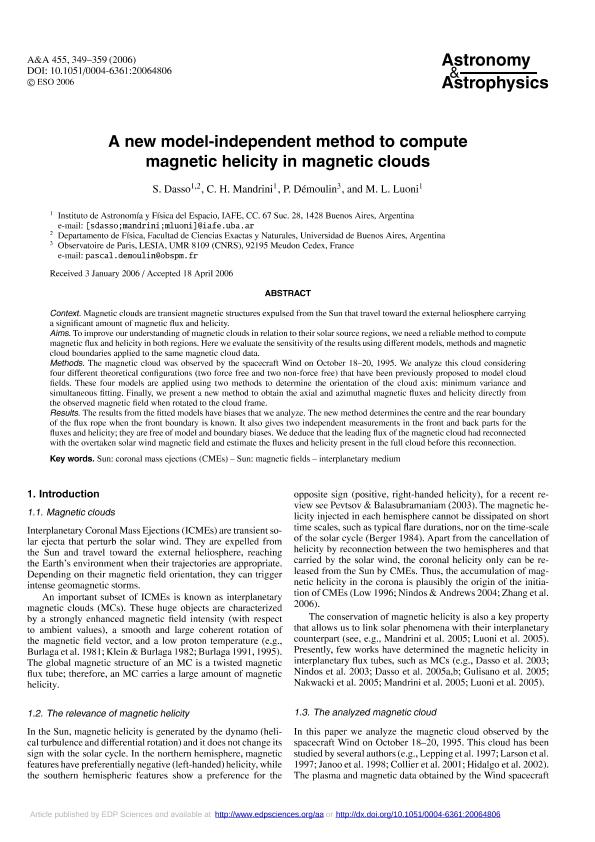Mostrar el registro sencillo del ítem
dc.contributor.author
Dasso, Sergio Ricardo

dc.contributor.author
Mandrini, Cristina Hemilse

dc.contributor.author
Démoulin, Pascal

dc.contributor.author
Luoni, Maria Luisa

dc.date.available
2017-08-08T18:26:22Z
dc.date.issued
2006-12
dc.identifier.citation
Dasso, Sergio Ricardo; Mandrini, Cristina Hemilse; Démoulin, Pascal; Luoni, Maria Luisa; A new model-independent method to compute magnetic helicity in magnetic clouds; EDP Sciences; Astronomy and Astrophysics; 455; 1; 12-2006; 349-359
dc.identifier.issn
0004-6361
dc.identifier.uri
http://hdl.handle.net/11336/22025
dc.description.abstract
Context.Magnetic clouds are transient magnetic structures expulsed from the Sun that travel toward the external heliosphere carrying a significant amount of magnetic flux and helicity.
Aims.To improve our understanding of magnetic clouds in relation to their solar source regions, we need a reliable method to compute magnetic flux and helicity in both regions. Here we evaluate the sensitivity of the results using different models, methods and magnetic cloud boundaries applied to the same magnetic cloud data.
Methods.The magnetic cloud was observed by the spacecraft Wind on October 18–20, 1995. We analyze this cloud considering four different theoretical configurations (two force free and two non-force free) that have been previously proposed to model cloud fields. These four models are applied using two methods to determine the orientation of the cloud axis: minimum variance and simultaneous fitting. Finally, we present a new method to obtain the axial and azimuthal magnetic fluxes and helicity directly from the observed magnetic field when rotated to the cloud frame.
Results.The results from the fitted models have biases that we analyze. The new method determines the centre and the rear boundary of the flux rope when the front boundary is known. It also gives two independent measurements in the front and back parts for the fluxes and helicity; they are free of model and boundary biases. We deduce that the leading flux of the magnetic cloud had reconnected with the overtaken solar wind magnetic field and estimate the fluxes and helicity present in the full cloud before this reconnection.
dc.format
application/pdf
dc.language.iso
eng
dc.publisher
EDP Sciences

dc.rights
info:eu-repo/semantics/openAccess
dc.rights.uri
https://creativecommons.org/licenses/by-nc-sa/2.5/ar/
dc.subject
Solar Wind
dc.subject
Space Weather
dc.subject.classification
Astronomía

dc.subject.classification
Ciencias Físicas

dc.subject.classification
CIENCIAS NATURALES Y EXACTAS

dc.title
A new model-independent method to compute magnetic helicity in magnetic clouds
dc.type
info:eu-repo/semantics/article
dc.type
info:ar-repo/semantics/artículo
dc.type
info:eu-repo/semantics/publishedVersion
dc.date.updated
2017-08-07T19:06:06Z
dc.journal.volume
455
dc.journal.number
1
dc.journal.pagination
349-359
dc.journal.pais
Francia

dc.journal.ciudad
Paris
dc.description.fil
Fil: Dasso, Sergio Ricardo. Consejo Nacional de Investigaciónes Científicas y Técnicas. Oficina de Coordinación Administrativa Ciudad Universitaria. Instituto de Astronomía y Física del Espacio. - Universidad de Buenos Aires. Facultad de Ciencias Exactas y Naturales. Instituto de Astronomía y Física del Espacio; Argentina
dc.description.fil
Fil: Mandrini, Cristina Hemilse. Consejo Nacional de Investigaciónes Científicas y Técnicas. Oficina de Coordinación Administrativa Ciudad Universitaria. Instituto de Astronomía y Física del Espacio. - Universidad de Buenos Aires. Facultad de Ciencias Exactas y Naturales. Instituto de Astronomía y Física del Espacio; Argentina
dc.description.fil
Fil: Démoulin, Pascal. Centre National de la Recherche Scientifique. Observatoire de Paris; Francia
dc.description.fil
Fil: Luoni, Maria Luisa. Consejo Nacional de Investigaciónes Científicas y Técnicas. Oficina de Coordinación Administrativa Ciudad Universitaria. Instituto de Astronomía y Física del Espacio. - Universidad de Buenos Aires. Facultad de Ciencias Exactas y Naturales. Instituto de Astronomía y Física del Espacio; Argentina
dc.journal.title
Astronomy and Astrophysics

dc.relation.alternativeid
info:eu-repo/semantics/altIdentifier/doi/http://dx.doi.org/10.1051/0004-6361:20064806
dc.relation.alternativeid
info:eu-repo/semantics/altIdentifier/url/https://www.aanda.org/articles/aa/abs/2006/31/aa4806-06/aa4806-06.html
Archivos asociados
